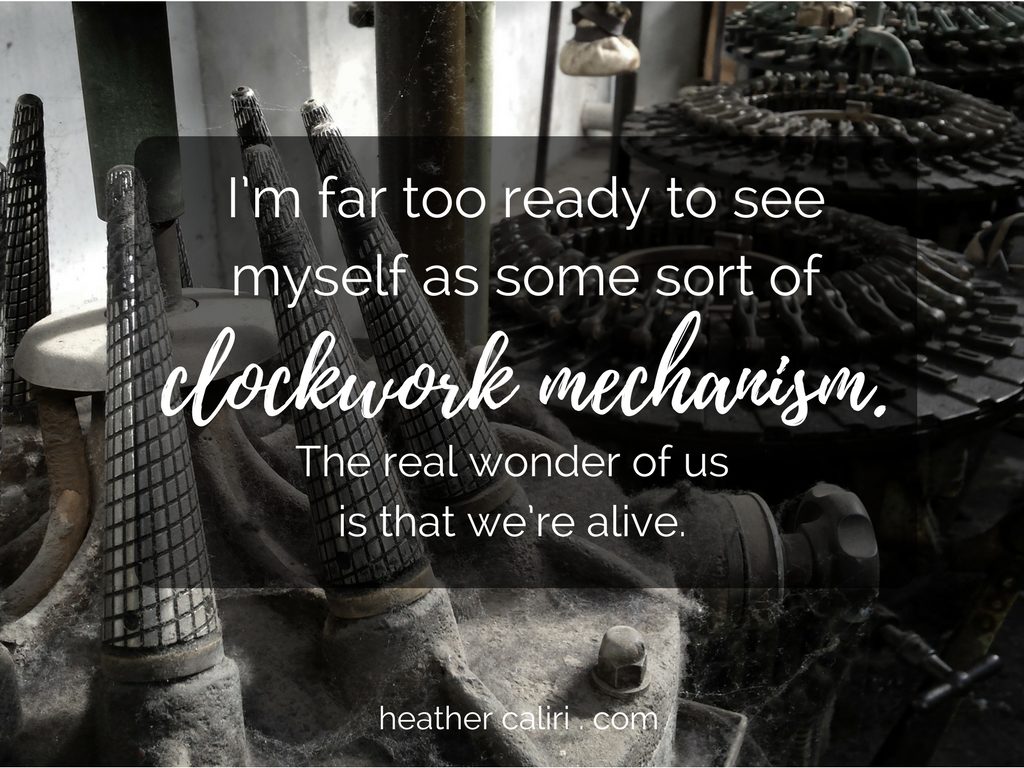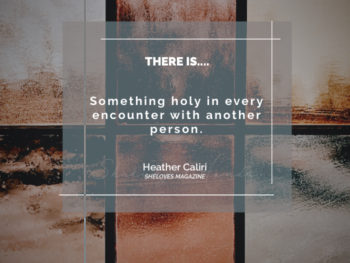The idea of “controlling metaphors” has been flitting around in my brain lately. For those of you who didn’t get excited about lit classes, a controlling metaphor is sort of an overarching motif that runs through an entire work of literature. For example, a controlling metaphor in C.S. Lewis’ Narnia books is Narnia is a version of the Kingdom of God.
In other words, a controlling metaphor is a window to understanding a big idea more clearly.
Of course, controlling metaphors aren’t just at work in literature or art. They are central to how we think. For example, American culture is chock full of “pioneer” metaphors. This influences trends as disparate as tech startups, the homeschooling movement, and why so many people get stuck in airports around major holidays.
As I’ve started facing my fears about faith in the past few years, I’ve started noticing the controlling metaphors that undergird them.
Surprise! Some of them are unhelpful. Here are the biggies.
Faith as school work.
I assume faith is a series of lessons I learn, in sequential order. I should learn them once, and consistently show (intellectual) mastery of the material. If I don’t, I fail.
For instance, I started learning the concept of “grace” in high school, and was ashamed and dismayed, at the age of twenty-two, when I realized I hadn’t understood it well. Then I was ashamed and dismayed again at thirty. And thirty-five.
Actually, at thirty-five, I started wondering whether “grace” was really something I was supposed to have down cold, as if it were multiplication tables. I started wondering whether understanding grace intellectually was even possible at all.
I’m trying to stop assuming only intellectual knowledge counts, that big ideas like grace can be learned, and that mature Christians will graduate to advanced coursework and left basic concepts like “loving our neighbor” behind.
Faith as a fitness workout.
I still remember watching my mom do Jane Fonda’s Workout as a kid. Big hair, French-cut leotards, and hot pink tights. Ahem. I still remember Jane looking right at the camera and telling me to “feel the burn.”
Look, I actually really like exercising. I go for long walks as often as I can, I do yoga, and we have a very retro Nordic-trak in our bedroom. I sleep a lot better and feel less anxious when I get some physical activity a few times a week.
But the way our culture approaches fitness bothers me, and that same sort of discomfort underlies my uneasiness with exercise as a metaphor for faith.
I see so many people exercise because they’re ashamed of their bodies (I am guilty of this, too). We are targeting “problem areas”, we’re working off Thanksgiving dinners. We’re exercising not because it feels good, but because we’re afraid of being out of shape. We push ourselves to feel the burn, sure that if it feels bad, it’s good for us.
In other words, we’re choosing to exercise to manage our shame, instead of choosing it with joy.
I want to sink down into my faith because it makes me whole and connects me to Jesus, not because I loathe myself and want to be fixed.
Faith as a diet plan.
I went down a hole with food when my youngest was a baby. I was really concerned that some of our sleep issues were allergy/intolerance related, so I tried a series of elimination diets.
I was also suffering from just a touch of post-partum depression at the time.
I didn’t have an eating disorder in the classical sense; I wasn’t trying to control my weight. But food did become a way to control my environment, convince myself I was doing everything right with parenting, and shame myself for falling short.
Are you rigid and fearful about spiritual disciplines? Do you shame yourself when you don’t keep up? Is the plan the god, instead of God? Are you judgy and prideful about your ‘good habits’? Is your approach to God about living up to an ideal, or nourishing your spirit and knowing Him?
I love the idea of faith as a banquet, a feast, a dinner party we’re invited to join. But seeing faith as a control mechanism can take away all the savor from how God feeds us.
Faith as machine
In college Crusade training, I learned the life of faith was like a train. The engine was labeled “fact”, the passenger car “faith” and the caboose, “feelings”.
Or there’s the popular song, “Jesus take the wheel,” where life is like a car we’re driving down the road, and faith is the gasoline.
I’m far too ready to see myself as some sort of clockwork mechanism. If something goes wrong, I assume I can swap it out with a spare part, or tinker with the engine. If I have negative feelings, I assume I’m supposed to soldier on and not be affected by them. If my faith isn’t working, I’m only good for the junkyard.
We’re so influenced by machinery in our age: machines that don’t get tired or have feelings about the work they’re asked to do. Machines that can be fixed or replaced. Machines that are mass-produced and interchangeable.
But the wonder of us is that we’re alive.
Jesus heals us, the whole of us, and there is no one else he can replace us with. We matter, not for our function, capacity, or efficiency, but for our sweet selves. Our faith will be different than anyone else’s, connected by delicate veins and musculature to our hearts and our heads and spirits. There is no planned obsolescence. We have no spare parts.
As I let go of these metaphors, I find myself more graceful with my messy, odd, complicated Christianity. Faith seems like something organic, very simple, and whole: like that giant garden shrub grown from the tiniest of seeds.
I’m curious—any metaphors that trip you up in faith? Do you have a different take on the ones I’ve listed here? Please share in the comment section.















 Why I swear sometimes
Why I swear sometimes
Faith as a magic wand. . . Loved this train of thought!
Thanks, Barb!